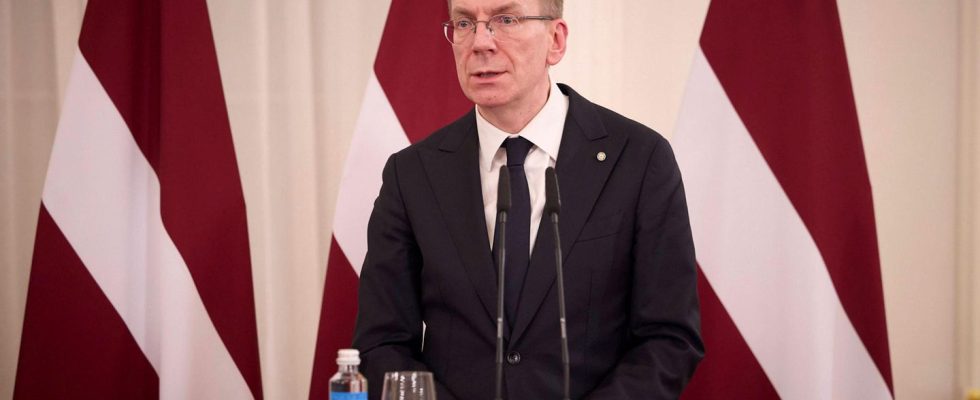Latvia is tightening the residence rules for citizens with a Russian passport. Vladimir Putin rails against the “swinish” treatment. Many people in Latvia are currently at a loss.
Russia is waging war against Ukraine, but complains that Russians in other countries have not suffered well. Kremlin leader Putin accuses the Baltics in particular of hunting people. There, EU member Latvia is threatening citizens with Russian passports with deportation. “There will certainly be forced expulsions,” says MP Gunars Kutris in Riga about the situation of Russians in Latvia.
Hundreds of people who have lived in the EU country for many decades and only speak Russian could be affected by the deportations. “This will become apparent in practice,” says the head of the Committee for Citizenship, Migration and Social Cohesion. In the future, anyone who cannot demonstrate knowledge of Latvian will have to leave the country. That could be up to 3,000 people.
In Russia, the power apparatus speaks of “discrimination” in an EU country that is committed to protecting the rights of minorities. Around a quarter of Latvia’s population of 1.9 million belongs to the large Russian-speaking minority.
Putin speaks of “swinish” treatment
Many people in the other Baltic states of Estonia and Lithuania are stateless or have a Russian passport. They came to the Baltics during communist times, when the three republics were forced to be part of the Soviet Union. Moscow, once the center of power for the Baltics, has been complaining for years that Russians are being discriminated against there.
“In the Baltic states, tens of thousands of people are being declared ‘subhuman’ and their most basic rights are being deprived,” Kremlin chief Vladimir Putin complained at a commemoration of the Second World War at the end of January. He had already previously spoken of – literally – “swinish” treatment of the Russians in Latvia. He accuses the government in Riga of politically abusing the generally hostile mood against Russia because of its war of aggression against Ukraine in order to take action against the long-unloved minority.
Anyone who wants to continue living legally in Latvia with a Russian passport must now apply for permanent residence status and prove that they have everyday knowledge of Latvian in a language test. The deadline for this was September 1st. Anyone who has not passed the test can apply for a two-year extension of their residence permit and repeat the test.
Latvia rejects Russia’s allegations
All others who did not report to the authorities on their own initiative have now received mail from the migration authority – they are threatened with being thrown out of Latvia. The background is changes to Latvia’s immigration law that were passed in autumn 2022 in response to Russia’s war of aggression against Ukraine.
Behind this lies the question that has arisen again and again since Latvia regained independence in 1991, as to how loyal the population of Russian origin is and how they would behave in the event of a conflict. There are fears that Russia could exploit and incite these people. Or, similar to Ukraine, even justify an invasion by saying that it has to protect its compatriots abroad.
Latvian President Edgars Rinkevics rejected Putin’s claims and Russian state propaganda. “We all know perfectly well that Russians living in Latvia are not discriminated against. But there are completely legitimate requirements: knowledge of the national language, and this is the basis of any country.”
Controversial treatment of pensioners of Russian origin
But especially in the east of the country on the border with Russia and Belarus, Russian is an everyday and colloquial language. This is one of the reasons why more than 60 percent of participants fail the language tests for level A2 the first time. The requirements are controversial. Critics point out that the regulation and possible expulsions primarily affect older and vulnerable people who do not pose a threat to national security. Many have already spent their entire lives in Latvia.
Anyone who speaks to Latvians in the old town of Riga will always hear: Yes, there was enough time to learn the language. Young people in particular should make an effort. But politicians could have demanded this 30 years ago after independence. It’s “nonsense” to expel older people, says pensioner Gunars of the German Press Agency on the street. The young passer-by Laura says: “It’s clear that an elderly grandma won’t suddenly learn Latvian tomorrow.”
Some of those affected say they don’t even know where they should go after being expelled from Latvia. Some participants in the Latvian language tests reported to the dpa that they did not come from Russia and had no family there. They once accepted Russian citizenship primarily in order to receive a pension from there. But some are now living in hardship because they no longer have legal residence status without a language test – and therefore no right to social benefits.
Russia creates program for its citizens abroad
The expulsion of 82-year-old Boris Katkov, who had lived in Latvia for more than 50 years, caused a stir in Russia in mid-January. The president of a Latvian-Russian cooperation organization was expelled because authorities in Riga said he posed a risk to the country’s national security.
Katkov had to leave his 13-member family, including grandchildren, more than half of whom are Latvian citizens, the government newspaper Rossiyskaya Gazeta reported. He was simply dropped off at the border, he said tearfully in a video. He was accommodated in the neighboring Russian Baltic Sea region of Kaliningrad.
It is not in sight that Putin will invade the NATO states in the Baltics with his army to protect Russian citizens. Rather, he ordered that a program be drawn up for the repatriation of Russians should an “illegal deportation” occur. A new institute for repatriations is intended to support people with Russian roots who were living abroad permanently before the war began on February 24, 2022, to settle in their homeland or that of their ancestors.

